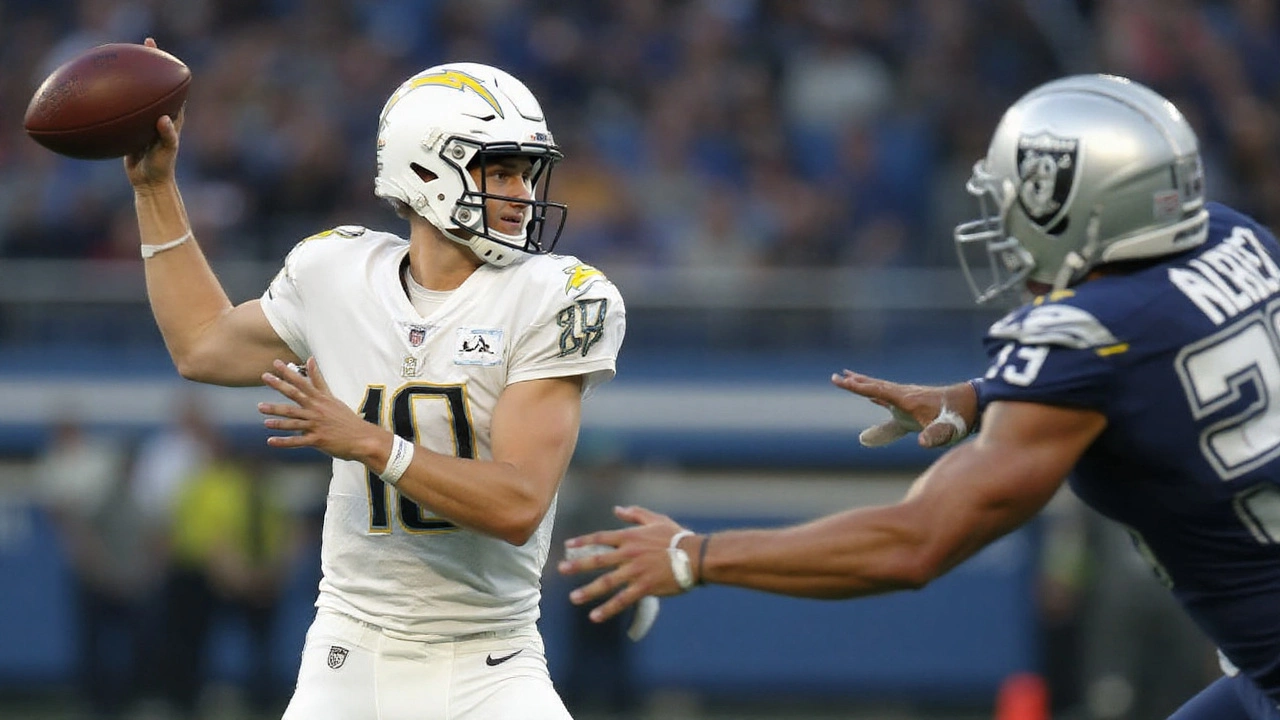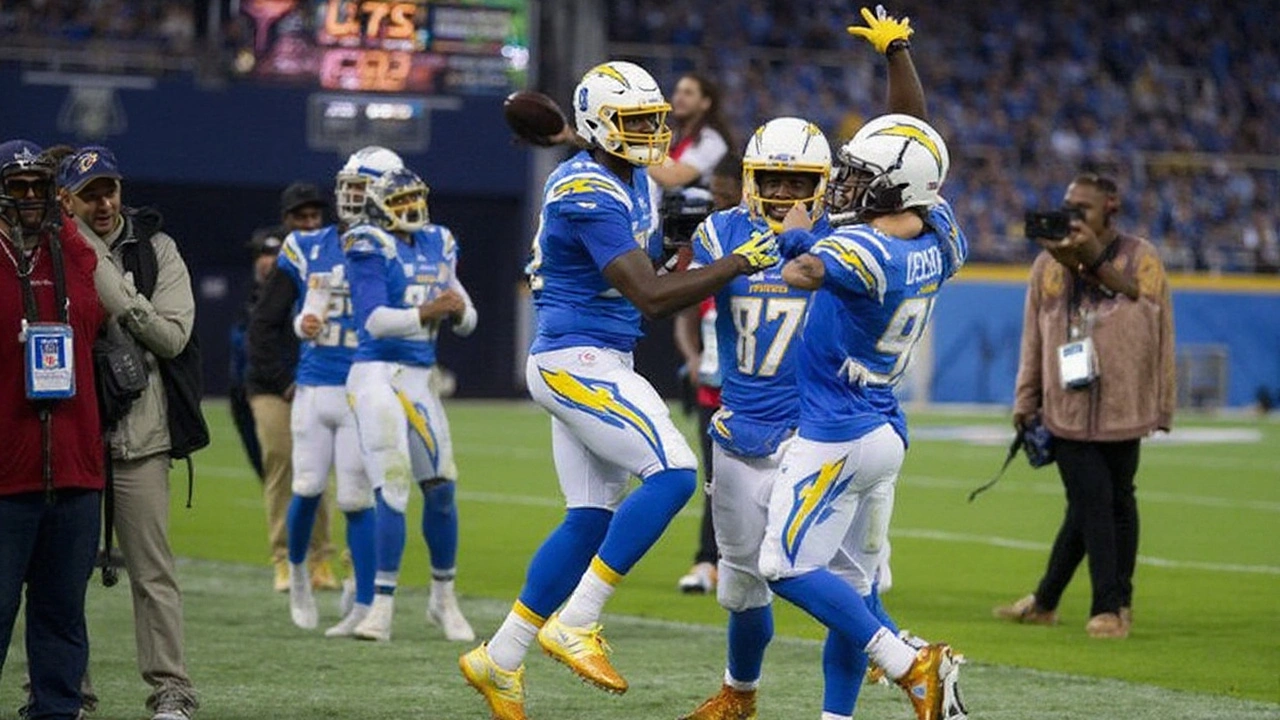Raiders vs Chargers on Monday Night Football: Herbert’s 60-yard strike seals 20-9 win

On the bright lights of Monday Night Football, the Raiders vs Chargers clash tilted hard toward Los Angeles. The Chargers beat the Raiders 20-9 in Week 2, riding an efficient, composed night from Justin Herbert and a defense that baited Geno Smith into three interceptions. The signature moment came seconds before halftime: a 60-yard lightning bolt to Quentin Johnston that stretched the lead and, in truth, broke the game open.
This wasn’t a fluke swing or a busted final drive. It felt like a statement of intent from Jim Harbaugh’s team. The Chargers looked comfortable in every phase—steady on the ground, selective but dangerous through the air, and disciplined on defense. For a second straight week, they played with the kind of balance and clarity that travels in the NFL.
Herbert, Harbaugh and a statement start
Herbert didn’t need to chase huge numbers to own the night. He played on time, took what the defense gave him, and punished mistakes. When the Raiders softened up late in the second quarter, he pounced. The two-minute sequence before halftime was textbook. Protection held, the route concepts stressed the middle of the field, and Johnston got the matchup he wanted. Herbert launched it, Johnston stacked his defender, and 60 yards later the Chargers were up 20-6 heading into the break. That was the dagger.
Call it Harbaugh’s imprint: the Chargers are leaning into control. The run game set a steady rhythm that kept them out of bad down-and-distance, and it kept the Raiders’ pass rush honest. From there, Herbert worked the quick game and play-action without forcing throws. The passing plan avoided low-percentage hero balls yet created the one explosive they needed. It looked like the ideal blend of structure and freedom.
Johnston’s ascendance was as important as the highlight itself. He attacked leverage, won downfield, and showed why the staff keeps carving out work for him. On nights like this, the Chargers don’t need 10 catches from their wideouts. They need a defense to respect every blade of grass. Johnston’s vertical win did exactly that, and it flipped how Las Vegas had to call the second half.
Defensively, the Chargers were patient and opportunistic. They disguised coverage, closed passing windows late, and forced Smith to throw into tight clusters of defenders. The pass rush didn’t need to rack up sacks to matter; the point was to rush in unison and force hurried, off-platform decisions. It worked. The interceptions didn’t come from chaos—they came from compressing Smith’s choices until the wrong one felt like the only one.
The moment that iced any faint Raiders comeback came with just under six minutes left. With Las Vegas trying to force a touchdown window to Jakobi Meyers, cornerback Donte Jackson undercut the route and picked it off. The timing mattered more than the box score. It was the right call, the right angle, and the clear proof the Chargers had read the Raiders’ tendencies.

Raiders’ misfires and Bowers’ limits
For Las Vegas, the night started bad and never found a rhythm. Smith threw an interception on the very first play, setting a tone the Raiders couldn’t shake. He pressed. He tried to fit throws into crowds. He kept hunting the shot that would flip momentum, and it wasn’t there. The numbers tell the story: 0-for-12 on throws traveling 10 or more air yards. That’s not just a cold streak—that’s a plan that didn’t match the coverage looks or the protection.
Some of this was structural. The Raiders had a chance to lean into the run and shorten the game, but they drifted between identities. One drive leaned conservative with checkdowns and quick outs; the next chased explosives into tight coverage. Without a defined lane, the offense lived in second-and-long, third-and-long, and a lot of field goals instead of touchdowns. You could sense the frustration in their pacing—huddles took a beat longer, and their tempo never rattled the Chargers.
The injury to tight end Brock Bowers mattered. He suited up with a knee issue and was clearly not at full speed. He finished with five catches for 38 yards and just one grab in the first half, most of it on short, controlled routes. That’s not the Bowers who threatens seams and stresses safeties. With defenses not worried about his burst, the Raiders lost a layer of their passing game. They needed him as a coverage dictator; instead, the Chargers were happy to rally and tackle underneath.
Smith’s turnovers were the obvious headline, but the deeper problem was decision flow. On multiple snaps, his eyes lingered on the first read, and by the time he worked through the progression, the window had closed. The Chargers leveraged that hesitation with zone match looks that felt like man pre-snap. Combine that with a pass rush collapsing the pocket from inside-out, and shots downfield became a losing bet. The 0-for-12 deep metric doesn’t happen unless all of those factors line up against you.
Credit the Chargers for staying on script after the early lead. They didn’t chase style points. They bled the clock, flipped field position, and forced the Raiders to drive the long way. That kind of control breaks teams that prefer splash plays over patience.
For Las Vegas, there’s a silver lining if they choose it. The defense actually held the line after halftime, giving the offense several chances to claw back. The problem was finishing drives. Too many stalls near the fringe of scoring range, too many plays a beat late. Clean up the turnovers, redefine the early down plan, and get Bowers healthier, and the Raiders look different fast.
Where does this leave both teams? The Chargers are 2-0 and, more importantly, they know what they are: balanced, disciplined, and explosive when the moment calls for it. That’s a Harbaugh fingerprint early in the season. Herbert is playing calm, and the supporting cast is slotting into roles that make sense. If Johnston keeps threatening deep and the defense keeps cashing in on takeaways, opponents will have to pick their poison.
For the Raiders at 1-1, the to-do list is clear. Tighten the read structure for Smith, lean into concepts that create defined, early answers, and find easy touches for Bowers that don’t ask him to win with burst until the knee is right. A steadier run/pass split would help—the kind that sets up play-action and simplifies third downs. They won’t face the Chargers’ disguises every week, but the Washington Commanders are up next, and they bring their own brand of defensive heat. The fix isn’t complicated; it’s about commitment to an identity and protecting the football.
Monday night gave us a simple snapshot. The Chargers didn’t just make big plays; they made the right ones at the right times. The Raiders didn’t just commit turnovers; they committed them in spots that undercut any chance at rhythm. Two weeks in, that’s the difference between a team building momentum and a team still searching for itself.